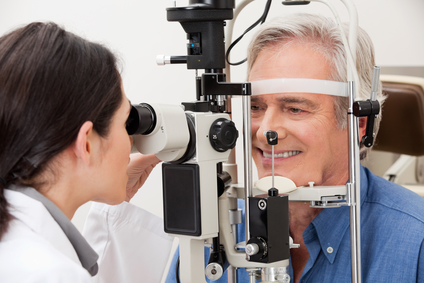When it comes to making an appointment with an eye doctor, patients often aren’t sure whether they need to see an ophthalmologist or an optometrist. What’s the difference between these two eye care professionals and how do you know which one you need to see?
Optometrists
An optometrist is can eye care professional who provides primary vision care. They perform comprehensive eye exams and vision tests, prescribe corrective lenses, diagnose certain eye issues, and prescribe medication for certain eye diseases and conditions.
Optometrists’ training includes three or more years of college and four years of optometry school to earn a doctor of optometry (OD) degree. They are licensed to practice optometry.
While optometrists typically are not trained or licensed to perform eye surgery, they can conduct pre and postoperative care related to eye surgery. They also are required to meet continuing education requirements to stay up-to-date in eye care standards and maintain their optometry license.
Ophthalmologists
Unlike optometrists, ophthalmologists are medical doctors (MD) or osteopathic doctors (DO) specializing in eye health and vision care. These eye doctors can vary in their level of training and what they are able to diagnose and treat.
In general, an ophthalmologist must complete 4 years of college, 4 years of medical school, a year of internship, and at least 3 years in a hospital-based ophthalmology residency. This type of doctor can also perform comprehensive eye exams to diagnose and treat vision problems, diagnose and treat eye disease, prescribe medication, and perform procedures such as LASIK or cataract surgery.
Opticians
While they aren’t eye doctors, opticians are another important part of your vision care. An optician is a technician who is trained to use a prescription provided by an optometrist or ophthalmologist to design and fit eyeglass lenses and frames. They do not diagnose or treat vision problems or eye diseases.
Which Doctor Do I Need To See – Optometrist or Ophthalmologist?
For many people whose eyes are generally healthy and require only routine eye exams, an optometrist or an ophthalmologist is qualified to handle your needs. An optometrist or ophthalmologist is a matter of personal preference.
For those that have eye health problems such as cataracts, glaucoma or macular degeneration, seeking medical care from an ophthalmologist may be recommended. Often eye diseases will be diagnosed by your optometrist first, who may refer you to or consult with an ophthalmologist to provide you the best care possible.
If you are interested in having vision correction surgery, such as LASIK or PRK, this would need to be performed by an ophthalmologist; although most LASIK eye surgeons work closely with optometrists for pre and postoperative screening and care for surgical patients.
Berkeley Eye Center offers a network of highly skilled ophthalmologists, optometrists and opticians at our 20 locations across Texas. No matter what your eye care needs, we can help. Click here to schedule an appointment online today.

